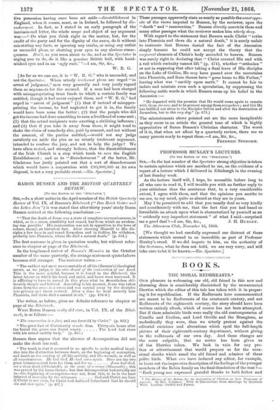BARON BUNSEN AND THE BRITISH QUARTERLY REVIEW.
[To THE EDITOR OF THE uSPECTATOR.1
SIR, —In a short notice in the April number of the British Quarterly Review of Vol. IX. of Bunsen's Bibelwerk (" Das Reich Gates and das Leben Jesu") it was stated that after thirty years' study Baron Bunsen arrived at the following conclusions :-
"' That the death of Jesus was a state of complete unconsciousness, in which, as in a swoon, sensibility had ceased, but from which an awaken- ing was possible.' His resurrection was not in opposition to the laws of nature, though an historical fact. After showing Himself to His dis- ciples a few days in and round Jerusalem and in Galileo, He withdrew, probably into Phconicia, where He died a natural death." (p. 584.)
The first sentence is given in quotation marks, but without refer- ence to chapter or page of the Bibelwerk.
In the lengthened review of atilleteS Memoirs in the October number of the same quarterly, the strange statement quotedabove becomes still stranger. The reviewer writes :— " The saddest and most unaccountable of all his (Bunsen's) theological errors, as we judge, is his utter denial of the resurrection of our Lord. This is the more painful, because it is found in the Bibelwerk, the latest labour on which his hand, and mind, and heart were bestowed. It is afflicting to have to record in this place what he fievertheless deli- berately thought and believed. According to his account, Jesus was taken down from the cross in a swoon and was carried away by the disciples into privacy and there revived. After a time he went secretly into Phoenicia, and there died a natural death." (pp. 493-4.)
The writer, as before, gives no definite reference to chapter or page of the Bibelwerk.
What Baron Bunsen really did state, in Vol. IX. of the Bibel- werk, is as follows :— " The resurrection is a fact, and one foretold by Christ." (p. 463.)
"The great fact of Christianity stands firm. Thirty-six hours after the burial the grave was found empty The Lord had risen with his actual earthly body." (p. 466.)
Bunsen then argues that the absence of decomposition did not make the death less real.
"The truth is that it occurred to no apostle to make medical inqui- ries into the distinction between death, as the beginning of corruption, and death as the ceasing of all life-activity, and life-warmth, as well as all consciousness. lie had died, Ile had risen again. Here are the two
great interconnected facts for them and for us Jesus had died, not a sham death (Scheintodt), in the sense of a swoon (Ohnnzacht) ; this VHS proved by the lance-thrust ; but that decomposition had actually set in—the beginning of corruption—was not, from this, to be in the least
inferred of necessity by the witnesses God and Christ are liars if Christ is not risen, for Christ had declared beforehand that he should die and rise again." (p. 467.)
These passages apparently state as nearly as possible the exact oppo- site of the views imputed to Bunsen, by the reviewer, upon the " death " and " resurrection." Bunsen directly asserts in these and.
many other passages what the reviewer makes him utterly deny.
With regard to the statement that Bunsen made Christ " retire into Phoenicia and there die a natural death," it is surely unfair to insinuate that Bunsen denied the fact of the Ascension simply because he could not accept the theory that the corporeal elements of Christ's body ascended to heaven. Bunsen was surely right in declaring that " Christ covered His end with a veil which curiosity cannot lift" (p. 474), whether " orthodox " or not in supposing that after taking a final leave of His disciples on the Lake of Galilee, He may have passed over the mountains into Phoenicia, and from thence have "gone home to His Father," leaving what was "earthly upon earth." It cannot be fair to isolate and misstate even such a speculation, by suppressing the following noble words in which Bunsen sums up his belief in the Ascension :—
" He departed with the promise that He would come again to remain with them for ever, and to be present among them everywhere ; and this He has fulfilled not alone to the disciples before and after the destruction of Jerusalem, but to this very day." (p. 475.)
The misstatements above pointed out are the snore inexplicable as they occur in an article the general tone of which is highly appreciative of Baron Bunsen's Christian character. The worst of it is, that when set afloat by a quarterly review, there are so many parrots ready to repeat them.—I am, Sir, &c., FREDERIC SEEBOISM.






































 Previous page
Previous page